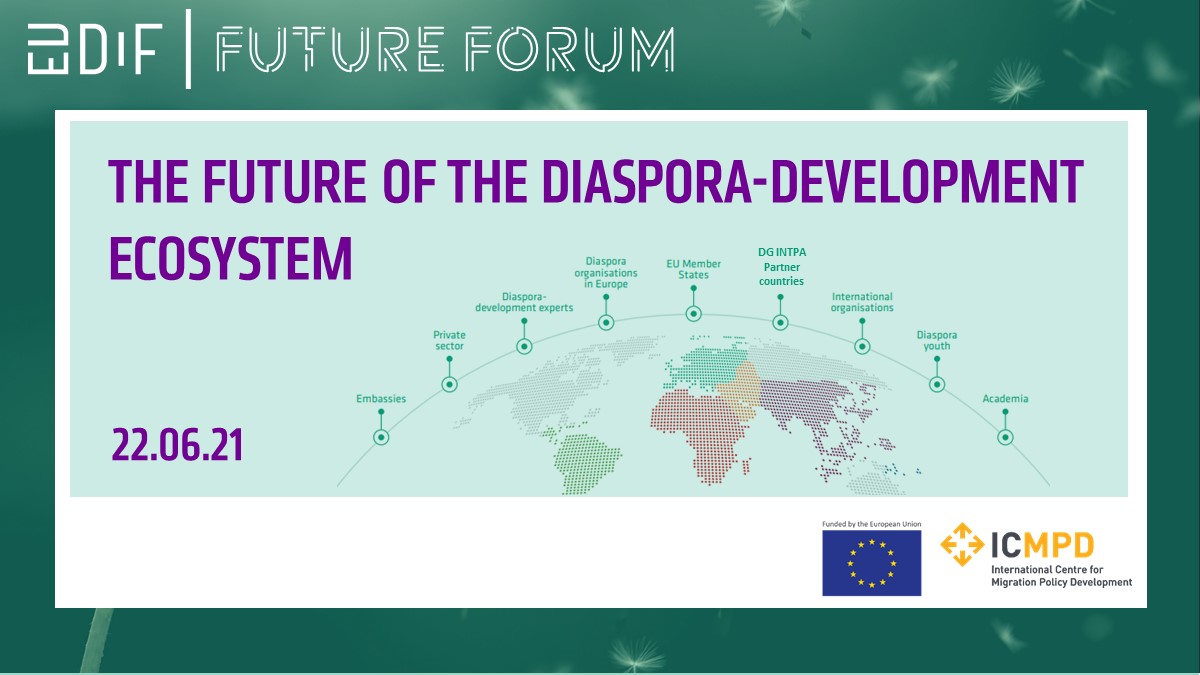
Tuesday 22 June is the opening day of the Future Forum. It is a moment to take stock of where we stand on diaspora engagement globally, considering what should and could be put in place to make the most of diaspora-engagement for development on all sides. Read on to learn what to expect from the seven sessions we are running on the first day.
Day 1: stocktaking & future-facing
In order to foster an informed, inclusive and impactful diaspora-development ecosystem, we must first consider where we stand and how we have reached this point, in order to discuss what works well and can be replicated or scaled up, and which areas have room for improvement or are newly important. The first day of the Future Forum brings to together the research which started the EUDiF project – our global mapping on Diaspora Engagement – and major trends and topics of concern that came up from the research and during our diaspora consultations, regional thematic meetings and meetings with EU Member States. Join us for a day of practices and priorities at both ends of the diaspora bridge, from government approaches to diaspora structures…
Morning sessions
- In the past twenty years, there has been a slow evolution towards greater institutionalisation of diaspora engagement. Of 107 countries mapped, 35 have adopted a diaspora engagement policy, or are in the process of doing so. However, it is difficult to know how many of these policies have been successfully implemented in practice. With the great diversity in diaspora engagement policies, how do we know when they are effective and how can we measure their impact? These are the questions on the agenda at 11:00 (all times CEST) in the session Homeland diaspora strategies. Join us to discuss 20 years of Azerbaijan’s diaspora policy and two different approaches to updating recent diaspora policies in Guyana and Zimbabwe – is there an opportunity to build in an impact measuring mechanism with the diaspora and how?
- The role of host countries remains often forgotten in discussions about diaspora engagement. However, without proper integration, diaspora members cannot contribute to the development of their home countries. There is a need to better understand the connections between diaspora, development and integration and consider them as different pieces of the diaspora engagement process as a whole. Going a step further in EU Member States’ involvement in the diaspora engagement process, some countries such as Italy, have gradually changed the emphasis of their diaspora engagement moving from integration aspects to being partners of development with the diaspora. At 11:00, during Destination diaspora: host country support models, you can hear from Belgium, Italy and Norway on their approaches, with insights from DG INTPA, diaspora and researchers to boot.
Afternoon sessions
- Diasporas are not monolithic and there is no ‘one-size-fits-all’ style of engagement, so knowing your diaspora is a crucial part of diaspora engagement. Mapping is often considered as the first step towards understanding the needs and varied interests of the diaspora. But in our world of big data and bigger aspirations, how can we employ digital tools and decades of experience to map and profile diaspora in all their diversity? Moreover, how effectively is data used by countries of origin to further their engagement strategies? All this and more in Mapping & profiling – a digital future at 13:30.
- Alternatively, at 13:30 you may be interested in the CDL & DP4D: technical support explainer to learn more about technical support provided through our Capacity Development Lab and Diaspora Professionals 4 Development, both of which have calls for applications open until 16 July.
- Increased interest in diaspora engagement from countries of origin has also led to some developments related to diaspora access to political rights. Many countries around the world are granting the right to vote for diaspora members and allow dual citizenship because it is considered as a necessary step to enable diaspora engagement. Of 107 countries mapped, only eight allow diaspora representatives to have a seat at the national parliament. In parallel, ensuring the participation of migrants in destination countries’ political system is equally important. At supra-national level, the European Parliament and the Parliamentary Assembly of the Council of Europe have also taken action to foster diaspora engagement. How do these rights affect diaspora engagement and a sentiment of belonging in both countries of heritage and destination? Join us during Voting matters at 15:30 to connect the dots between diaspora voting and parliamentary representation in and from Europe, a session organised in collaboration with the Parliamentary Network on Diaspora Policies.
- Diasporas themselves have grown more vocal and organised in their host countries with the gradual professionalization of diaspora organisations, some of which have expressed the need to build or strengthen umbrella organisations and supranational platforms. Such platforms can help key stakeholders and identify interlocutors in an often scattered ecosystem. Tune in at 15:30 for Diaspora networks – hows & whys, you will hear about three models of diaspora networks with the Africa-Europe Diaspora Development Platform (ADEPT), Comdu.it and Mujer Diaspora as well as a donor’s perspectives from the Swiss Agency for Development and Cooperation (SDC). The session will zone in on networks’ strengths and weaknesses in shaping the development agenda, advocacy and lobbying, and mobilising the expertise and resources to expand and improve their impact.
In short, join us on Tuesday 22 June to find out more about where we stand in terms of diaspora engagement and discuss how to connect the different perspectives and aspirations within the ecosystem to promote more inclusive and impactful engagement modes for the future.